By: Imaam Yakhsyallah Mansur
1st Sermon:
إنَّ الـحَمْدَ لِلّٰهِ نَـحْمَدُهُ وَنَسْتَعِيْنُهُ وَنَسْتَغْفِرُهُ، وَنَعُوذُ بِاللّٰهِ مِنْ شُرُورِ أَنْفُسِنَا وَمِنْ سَيِّئَاتِ أَعْمَالِنَا مَنْ يَهْدِهِ اللَّهُ فَلَا مُضِلَّ لَهُ وَمَنْ يُضْلِلْ فَلَا هَادِيَ لَهُ، أَشْهَدُ أَنْ لاَّ إِلَهَ إِلاَّ الله وَحْدَهُ لَا شَرِيْكَ لَهُ، وَأَشْهَدُ أَنَّ مُـحَمَّداً عَبْدُهُ وَرَسُولُه، اللّٰهُمَّ صَلِّ و سَلِّمْ وَبارِكْ عَلَى سَيِّدِنا مُحَمّدٍ وَعَلَى اٰلِه وَأصْحابِهِ وَالتَّابِعينَ بِإحْسانِ إلَى يَوْمِ الدِّين، أَمَّا بَعْدُ: فَيَا أيُّهَا الإِخْوَة أوْصُيْكُمْ وَنَفْسِيْ بِتَقْوَى اللهِ وَطَاعَتِهِ لَعَلَّكُمْ تُفْلِحُوْنْ، قَالَ اللهُ تَعَالىَ فِي اْلقُرْانِ اْلكَرِيمْ: يَا أَيُّهَا الَّذِينَ آمَنُوا اتَّقُوا اللَّهَ حَقَّ تُقَاتِهِ وَلَا تَمُوتُنَّ إِلَّا وَأَنْتُمْ مُسْلِمُونَ، وَقَالَ الَنَّبِيُ صَلَّى اللّٰهُ عَلَيْهِ وَسَلَّمَ .فَإِنَّ خَيْرَ الْحَدِيثِ كِتَابُ اللَّهِ، وَخَيْرَ الْهَدْيِ هَدْيُ مُحَمَّدٍ، وَشَرَّ الأُمُورِ مُحْدَثَاتُهَا، وَكُلَّ مُحْدَثَةٍ بِدْعَةٌ، وَكُلَّ بِدْعَةٍ ضَلاَلَةٌ، وَكُلَّ ضَلاَلَةٍ فِي النَّارِ.
Let us always increase our faith and piety to Allah Subhanahu wa Ta’ala while giving praise and thanks to Him.
Also Read: Verses of the Universe in Gaza: The Unyielding Light of Faith
Thanks to His grace and love, to this day we can carry out a series of worship and good deeds, especially this afternoon we can perform Friday prayers.
In fact, piety is a gift given by Allah Ta’ala to selected servants. Piety will make humans speak the truth, behave noble and have other commendable qualities.
Piety is the key to the success of a servant in achieving happiness and safety in life, both in this world and in the hereafter that lasts forever.
Maasyiral Muslimin, hafidzakumullah
Also Read: Prophet Sulaiman Alaihi Salam, the Greatest Muslim King of All Time
On the occasion of the Friday sermon in Shawwal, post-Ramadan, let us meditate on the words of Allah Subhanahu wa Ta’ala in Al-Qur’an Surah Ali Imron [3] verses 133-135, which reads:
وَسَارِعُوٓا۟ إِلَىٰ مَغْفِرَةٍ مِّن رَّبِّكُمْ وَجَنَّةٍ عَرْضُهَا ٱلسَّمَٰوَٰتُ وَٱلْأَرْضُ أُعِدَّتْ لِلْمُتَّقِينَ (١٣٣) ٱلَّذِينَ يُنفِقُونَ فِى ٱلسَّرَّآءِ وَٱلضَّرَّآءِ وَٱلْكَٰظِمِينَ ٱلْغَيْظَ وَٱلْعَافِينَ عَنِ ٱلنَّاسِ ۗ وَٱللَّهُ يُحِبُّ ٱلْمُحْسِنِينَ (١٣٤) وَٱلَّذِينَ إِذَا فَعَلُوا۟ فَٰحِشَةً أَوْ ظَلَمُوٓا۟ أَنفُسَهُمْ ذَكَرُوا۟ ٱللَّهَ فَٱسْتَغْفَرُوا۟ لِذُنُوبِهِمْ وَمَن يَغْفِرُ ٱلذُّنُوبَ إِلَّا ٱللَّهُ وَلَمْ يُصِرُّوا۟ عَلَىٰ مَا فَعَلُوا۟ وَهُمْ يَعْلَمُونَ (١٣٥) (ال عمران [٣]: ١٣٣ـــ١٣٥)
“Hurry up and seek forgiveness from your Lord and get a paradise that is as wide as the heavens and the earth, which is reserved for those who are pious. (namely) those who spend their (wealth), both in the free and narrow, and those who hold back their anger and forgive (mistakes) of people. Allah loves those who do good. And (also) those who, when they commit abominable acts or abuse themselves, they remember Allah, then ask forgiveness for their sins and who else can forgive sins other than Allah? And they did not continue their abominable deeds, while they knew.”
As-Shaykh Dr. Muhammad Sulaiman Al Asyqar, in the book “Zubdatut Tafsir Min Fathil Qadir” said, the verse above is an order from Allah Ta’ala to immediately do repentance and good deeds and not delay doing good.
Also Read: Imaam Yakhsyallah Mansur: Surah At-Tin Indicates the Command to Liberate Al-Aqsa
Delaying repentance and good deeds can make those deeds not carried out because we don’t know when death will pick us up.
In addition, the bad result of procrastinating good deeds is that the results achieved are less than optimal, and can even fail. Something that is postponed will usually be done closer to the final deadline than has been planned, so that to finish it, it is done haphazardly, ignoring quality and quality aspects.
Maasyiral Muslimin, hafidzakumullah
The verse above informs that in order to reach heaven that is as wide as the heavens and the earth, there are five characteristics that pious people should have.
Also Read: Imaam Yakhsyallah: Nurture Love for the Prophet, One Will Be with Whom One Loves
First, spend in all conditions.
Infaq and alms that have been trained in the month of Ramadan, should be continued in the following months.
When in the field, he spends his wealth as much as possible. Even in narrow times, he still spends according to his ability. When given convenience, he uses his wealth to help the struggle. When in trouble, he still helps, even though he looks small in people’s eyes.
During the Tabuk war, there was a famine. But Rasulullah Shallallahu alaihi Wasallam ordered his companions to spend. Sayyidina Abu Bakr donated all his wealth. Sayyidina Umar spent half of his wealth. Until there was a friend who because of economic limitations, he spent with a handful of dates.
Also Read: Friday Sermon: Emulating the Firmness of the Prophet in Struggle
The hypocrites mocked, what is a handful of dates given for? However, the Prophet Shallallahu alaihi Wasallam praised him as a form of his sincerity in welcoming the call of Allah and His Messenger.
Maasyiral Muslimin, hafidzakumullah
The second characteristic of pious people, is holding back anger.
Ibn Kathir explained that the word Al-Kadzimin means a container full of water, then closed tightly so it doesn’t spill.
Also Read: Imaam Yakhsyallah: Muslims Unity as Key to Victory of Islam
This is an analogy that when someone is angry and he has the ability to retaliate, however, he holds it so that the anger is not vented.
The glory of people who are able to hold back anger was said by the Prophet sallallaahu ‘alaihi wasallam:
مَنْ كَظَمَ غَيْظًا وَهُوَ قَادِرٌ عَلَى أَنْ يُنْفِذَهُ، دَعَاهُ اللَّهُ عَزَّ وَجَلَّ عَلَى رُ ءُوسِ الْخَلَائِقِ يَوْمَ الْقِيَامَةِ حَتَّى يُخَيِّرَهُ اللَّهُ مِنَ الْحُورِ الْعِينِ مَا شَاءَ (رواه ابو داود)
“Whoever holds back anger while he is able to vent it, Allah will call him on the Day of Resurrection in front of all humans until Allah allows him to choose the angel with beautiful eyes he wants.” (Narrated by Abu Dawud)
Also Read: Friday Sermon: Prophet Muhammad Is Not a Political Figure
The third character is, to forgive humans.
Al-‘Afin itself is taken from the word Al-‘Afwu, which means erasing. Forgiveness means removing the wounds or scars that are in the heart. It is not called forgiveness, if there is still a burning feeling of envy and revenge in the heart.
Why do we need to forgive others? Because humans were created not as holy creatures like angels. He has the potential to make mistakes, it could be because he has no knowledge, or because he accidentally, forgot or made a mistake in his actions.
So by forgiving others, Allah Subhanahu wa Ta’ala will give him forgiveness and forgiveness for his sins. This is mentioned in surah An-Nuur [24] verse 22:
Also Read: Without Knowledge, Congregation Is Merely a Crowd Without Direction
وَلۡيَعۡفُواْ وَلۡيَصۡفَحُوٓاْۗ أَلَا تُحِبُّونَ أَن يَغۡفِرَ ٱللَّهُ لَكُمۡۚ
“… Let them forgive and broaden their chests. Don’t you want to be forgiven by Allah? …”
So, with that forgiveness, we have removed malice, hatred, revenge and heart disease in ourselves. By forgiving, Allah Ta’ala will also forgive the sins we have committed.
Maasyiral Muslimin, hafidzakumullah
Also Read: Friday Sermon: Grateful for Indonesia’s Independence by Supporting Palestine’s Freedom
The fourth character of pious people is, muhsinin. Shaykh Wahbah Az-Zuhaili explained that muhsinin are people who return bad things with good.
If someone criticizes and hurts us, we are able to hold back our anger, then forgive him and repay his bad deeds by making friendship and bringing something as a gift for him, that is an example of the muhsinin. If someone makes fun of us, but we actually help and provide assistance to him, that is an example of the muhsinin.
Ramadan has educated us to do good to anyone. So let’s continue this practice throughout the year because that is the main character of pious people.
The fifth character, when he commits a sin, he immediately remembers Allah Ta’ala and asks Him for forgiveness.
Also Read: The Bestial Nature of Netanyahu
Rasulullah Shallallahu alaihi Wasallam said:
طُوبَى لِمَنْ وَجَدَ فِي صَحِيْفَتِه اسْتِغْفَاراً كَثِيراً (رواه البيهقي)
“It’s really lucky people who find a lot of forgiveness in their records.” (Reported by Al-Bayhaqi)
Istighfar is also a means of taqarrub to Allah Subhanahu wa Ta’ala. Our infallible Apostle, he istighfar 70 times a day. So, we as his people, should emulate that.
Hopefully, we are all able to have the character of pious people as mentioned in the verse above and may we all be among those whom Allah Ta’ala bestows heaven. Amen O Lord of the Worlds.
بَارَكَ اللهُ لِيْ وَلَكُمْ فِي الْقُرْآنِ الْعَظِيْمِ، وَنَفَعَنِيْ وَإِيَّاكُمْ بِمَا فِيْهِ مِنَ اْلآيَاتِ وَالذِّكْرِ الْحَكِيْمِ. أَقُوْلُ قَوْلِيْ هَٰذَا وَأَسْتَغْفِرُوا اللهَ الْعَظِيْمَ . اِنَّهٗ هُوَ الْبَرُّ الرَّحِيْمِ.
Second Sermon:
اَلْحَمْدُ لِلّٰهِ الَّذِيْ اَمَرَنَا بِلُزُوْمِ اْلجَمَاعَةِ، وَنَهَانَا عَنِ اْلاِخْتِلَافِ وَالتَفَرُّقَةِ ، وَاْلصَّلَاةُ وَالسَّلآ مُ عَلٰى نَبِيِّ الرَّحْمَةِ، وَعَلٰى اٰلِهِ وَاَصْحَا بِهِ هُدَاةِ اْلاُمَّةِ، أَمَّا بَعْدُ. فَيَآيُّهَا اْلمُسْلِمُوْنَ، اُوْصِيْكُمْ وَنَفْسِى بِتَقْوَى اللهِ فَقَدْ فَازَ اْلمُتَّقُوْنَ، وَقَالَ اللهُ تَعاَلَى أَعُوْذُ بِاللّٰهِ مِنَ الَّشيْطَانِ الرَّجِيْم ،إِنَّ اللهَ وَمَلآئِكَتَهٗ يُصَلُّوْنَ عَلىَ النَّبِى يآ اَيُّهَا الَّذِيْنَ آمَنُوْا صَلُّوْا عَلَيْهِ وَسَلِّمُوْا تَسْلِيْمًا. اَللَٰهُمَّ صَلِّ عَلَى مُحَمَّدٍ وَعَلَى آلِ مُحَمَّدٍ كَمَا صَلَّيْتَ عَلَى إِبْرَاهِيْمَ وَعَلَى آلِ إِبْرَاهِيْمَ، إِنَّكَ حَمِيْدٌ مَجِيْدٌ. وَبَارِكْ عَلَى مُحَمَّدٍ وَعَلَى آلِ مُحَمَّدٍ كَمَا بَارَكْتَ عَلَى إِبْرَاهِيْمَ وَعَلَى آلِ إِبْرَاهِيْمَ، إِنَّكَ حَمِيْدٌ مَجِيْدٌ.
اَللهُمَّ اغْفِرْ لِلْمُؤْمِنِيْنَ وَاْلمُؤْمِنَاتِ وَاْلمُسْلِمِيْنَ وَاْلمُسْلِمَاتِ اَلاَحْيآءِ مِنْهُمْ وَاْلاَمْوَاتِ، اللّٰهُمَّ انْصُرْ اِخْوَانَنَآلْمُجَا هِدِيْنَ فِى فِلِسْطِيْنِ وَفِى كُلِّ مَكَانٍ .اللّٰهُمَّ أَعِزَّ اْلإِسْلاَمَ وَاْلمُسْلِمِيْنَ وَأَذِلَّ الشِّرْكَ وَاْلمُشْرِكِيْنَ وَانْصُرْ عِبَادَكَ آْلمُوَحِّدِيْنَ وَانْصُرْ مَنْ نَصَرَ الدِّيْنَ وَاخْذُلْ مَنْ خَذَلَ اْلمُسْلِمِيْنَ وَ دَمِّرْ أَعْدَاءَ الدِّيْنِ وَاعْلِ كَلِمَاتِكَ إِلَى يَوْمَ الدِّيْنِ. اللّٰهُمَّ ادْفَعْ عَنَّا اْلبَلاَءَ وَاْلوَبَاءَ وَالزَّلاَزِلَ وَاْلمِحَنَ وَسُوْءَ اْلفِتْنَةِ وَاْلمِحَنَ مَا ظَهَرَ مِنْهَا وَمَا بَطَنَ مِنْ بَلَدِنَاهَذَا خآصَّةً وَسَائِرِ اْلبُلْدَانِ اْلمُسْلِمِيْنَ عآمَّةً ، يَا رَبَّ اْلعَالَمِيْنَ. رَبَّنَا ظَلَمْنَا اَنْفُسَنَا وَإنْ لَمْ تَغْفِرْ لَنَا وَتَرْحَمْنَا لَنَكُوْنَنَّ مِنَ اْلخَاسِرِيْنَ. رَبَّنَا آتِناَ فِى الدُّنْيَا حَسَنَةً وَفِى اْلآخِرَةِ حَسَنَةً وَقِنَا عَذَابَ النَّارِ.
(T/RE1)
Mi’raj News Agency (MINA)






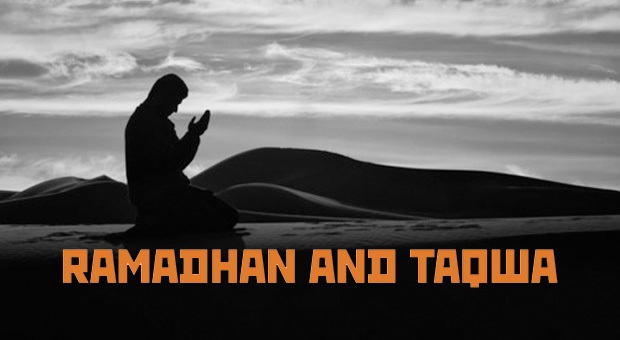


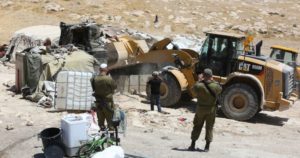

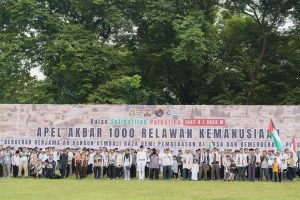
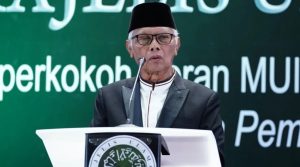

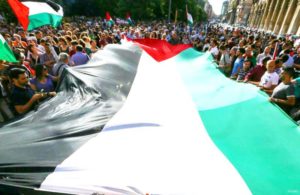
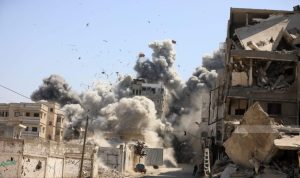


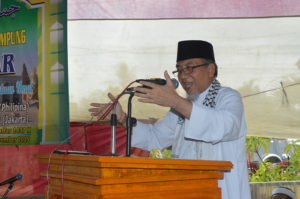
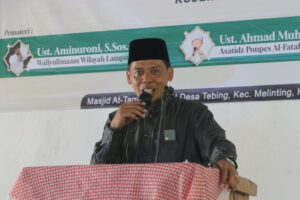
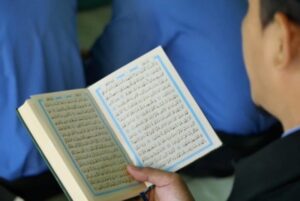













 Mina Indonesia
Mina Indonesia Mina Arabic
Mina Arabic